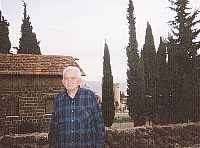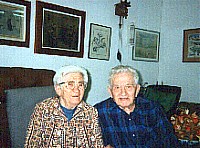The course of history can be changed by the determination of one man who stands up for what he believes in when he is listened to by people who are in a position of power.
The initiative to demand that Israel take the Golan Heights came from not from real estate-seeking settlers who wanted to move to the Golan, but rather from the residents of the Upper Galilee, or, to put it better, directly from the regional Mayor of the Upper Galilee, Yaakov (Yankela) Eshkoli, the man who led the delegation of Upper Galilee residents to lobby Israeli Prime Minister Levi Eshkol and the Israeli government on the fourth night of the Six Day War.
Eshkoli’s mission: to convince Eshkol to issue an order to the Israel Defence Forces Northern regional command to take the Golan Heights and to remove the Syrian threat, once and for all, from over the heads of the Galilee settlements. 
Eshkoli, now 88, was elected four times to be the regional mayor of the Galilee, and served in his position from 1955-1971
Speaking with remarkable resilience and a clear memory after 20 years of severe heart disease, the aging Eshkoli, with his ninety year old wife Yaffa at his side, cannot keep repeating how pleased he is that he has lived to tell his story, while talks with Syria get under way and while the future of the Golan is indeed on the agenda.
“13 years ago I had a heart attack and the doctors declared me to be clinically dead. I guess I recovered so that I could tell my story today”, Eshkoli says, with a wink and a twinkle in his eye, when I met him on his porch, on Kibbutz Cfar Giladi. 
Cfar Giladi is one of the oldest Galilee settlements, located just north of Kiryat Shmoneh and sandwiched in between Lebanon and the Golan Heights, where he and Yaffa, now 90 years old, have been kibbutz members since 1932.
Eshkoli says that he is always eager to relate the role that he played in convincing the Israeli government to take the Golan in the midst of the 1967 war.
As Eshkoli tells it, by the fourth day of the 1967 war, it was clear that Israel had delivered a solid defeat to Jordan and Egypt.
That left Syria, which had been raining a steady stream of rockets into the Hula Valley below, leaving the residents of 31 settlements in the Upper Galilee region in Eshkoli’s jurisdiction to spend those glorious days of 1967 in deep underground bunkers, glued to their transistor radios.
Eshkoli recalls how he placed constant calls into Israeli Deputy Prime Minister Yigal Allon from his underground bunker on the Kibbutz to ask to see Levi Eshkol, then Israel’s prime minister, to demand action on the Syrian front.
Allon, the 1948 war hero who with liberated the Galilee, promised to get Eshkoli called him on the fourth day of the war with the good news that Eshkoli could meet Eshkol and the Israeli cabinet that evening, warning him that at least one senior Israeli cabinet minister opposed any move towards the Golan Heights….
Leaving his kibbutz in an army jeep, picking up Kibbutz leaders from other settlements in the region, while every kibbutz member was ordered into the shelters because of the continuing Syrian artillery bombardment, Eshkoli remembers that he had the feeling that his Hula valley was burning while the rest of the country was dancing in the streets
Eshkoli speaks of his descending the steps into the underground headquarters of the Israeli government in Tel Aviv as if it happened last night. Eshkoli gets tears in his eyes when he describes the hug that Levi Eshkol gave him when he showed up. Eshkoli that his full delegation of four be allowed to enter the cabinet meeting, and he recalls the Bible that he was asked to swear on that any matter of security that he would hear would be kept in strictest confidence.
Eshkoli was given five minutes to speak. “The longest five minutes in my life”, Eshkoli remembers. His appeal was simple and clear, when he reminded Eshkol that he and every Israeli leader who had ever come to visit him in the Galilee after Syrian rocket attacks had promised them that if there would ever be another war, that they would use that opportunity to remove the Syrian threat, once and for all.
Eshkoli reports that the one Israeli minister to oppose the idea: Moshe Dayan, the former Israeli commander in chief who had just been appointed to be Defence minister. Dayan had given the veto to his northern regional commander, “Dado” Elazar, whom he forbid to attack Syria on the Golan, “lest this cost us 30,000 dead and risk a war with the Soviet Union”, which had just pushed through a cease-fire in the UN Security Council. Dayan the war hero from the 1956 war with tremendous popular following, also made a great impression on the cabinet.
Eshkoli recalls that he then thought to himself: “Will I be responsible for world war”, and then said that ” I could only think of my wife and the children of the kibbutz who at that moment were in the shelters”. It was then that Eshkoli made a threat, which he says to this day that he meant with all his heart, which was that if the IDF does not remove the Syrians from the Golan then he would recommend that all Kibbutzim pack their bags and leave, and that the people of Kiryat Shmoneh would follow. Silence followed Eshkoli’s emotional appeal to the Israeli cabinet.
As Eshkoli turned and began to leave the meeting, Israeli Prime Minister Levi Eshkol grabbed his hand and proclaimed that “The words of Eshkoli have entered the heart of Levi Eshkol, and they will play a crucial role in what we decide to do on the Golan Heights”.
Eshkoli could not know when he left the government meeting, heading back north, whether he had succeeded in his mission. Would his words hold greater weight than Moshe Dayan?
Heading back to Kfar Giladi, Eshkoli stopped off at the bunker of the IDF Northern regional command. By then it was 5AM. “Dado” was slumped over his desk, next to a bottle of half-empty scotch.
Eshkoli reported to “Dado” what had happened at the government meeting. And while they were talking, “Dado” received a call from the Israel Defence Ministry. Moshe Dayan’s resonant voice was on the line with an order – “Ascend the Golan and Succeed” were Dayan’s words, and they were repeated on the 6AM Voice of Israel radio newsreel.
“Dado” loudly said to Eshkoli that he had succeeded with Dayan where he, the IDF northern regional commander had not.
Indeed, Dayan’s vote in the government was the lone voice in the government to vote against the Golan attack….
Dayan never forgave Eshkoli for besting him at the government meeting. Eshkoli shows me a yellowing news interview from 1976 with Moshe Dayan with the Israeli daily newspaper Yediot Aharonot, where Moshe Dayan could only recall Eshkoli and his delegation with anger and resentment, characterizing them as “Dado”‘s agents, claiming that, anyway, “the provocation’s of the Galilee farmers and fishermen in no-man’s land were the cause of the Syrian shellings”.
Eshkoli looks at the picture of Moshe Dayan and starts to yell at him “Right – All of my 31 communities provoked the Syrians from their shelters. Our provocation against the Syrians is that we live and prosper here in the Galilee, which the Syrians see as a province of their country”.
Asked about the current negotiations that might bring the Syrians back to the Golan Heights that face down on his kibbutz, Eshkoli could only raise a trembling hand and point to the hills and say that to “bring back the Syrians would be suicide for us”.
Eshkoli’s successor as regional mayor of the Upper Galilee region, fellow Kfar Giladi member Aharon Valenci, is much more sanguine in his attitude to the possibility of territorial compromise on the Golan, saying that he trusts Israeli Prime Minister Ehud Barak and that if the Syrians are serious about peace, then the issue of the Golan would not be as important as it once was, noting that “99%” of his kibbutz were supportive of the peace process with Syria. Valanci said, however, that he will wait to see what the Syrians convey to their own people in their own media.
However, another prominent Galilee kibbutz leader, Muki Tzur, from Ein Gev, on the shores of the Sea of the Galilee and meters away from the Golan Heights and what might again be Syria, writes an interview with KIBBUTZ, the magazine of the Kibbutz movement, that it was premature to take a position on the peace process.
Tzur, the 1967 author of the best selling book known as the Seventh Day: Conversations with Fighters from the Six Day War, writes in his article that Jewish and Israeli history has taught us that any peace process with Israel’s adversaries will be long, hard and complex, and that no decision can be made under the pressure of an immediate desire for peace. The price of a mistake in the peace process in the North would be guns in place once again on the Golan, trained on the 31 settlements of the Hula Valley in Israel’s lush Upper Galilee region.
Yankela Eshkoli stood up to Moshe Dayan.
That is why the guns in the Golan were removed, and that is why 33 Israeli settlements replaced 15 Syrian army camps on the Golan Heights.









